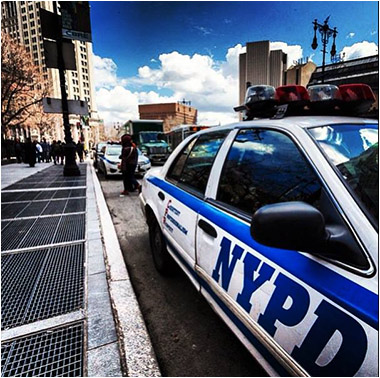Infowars.com
August 12, 2013
New York City’s Stop and Frisk policy was declared unconstitutional today by a U.S. District Court judge who ruled that the practice of stopping, questioning and frisking pedestrians violated key provisions of the U.S. Constitution.

Via NYPD Facebook.
The 198-page judge’s decision found that 80 percent of people stopped were disproportionately “Latino” or black and that only 6 percent of stops actually resulted in arrest, while a staggering 88 percent of victims stopped were released without “further law enforcement action.”
For more than a decade, the program has been touted by the likes of former Mayor Rudy Giuliani, current Mayor Michael Bloomberg and police commissioner Raymond Kelly as a necessary evil to combat crime, with Bloomberg and Kelly defending racial targeting by claiming that those races were the ones committing the most crime.
“This position intentionally ignores the fact the data which shows, even after controlling for crime rates, the NYPD still discriminates. It’s very important that people interested in this case understand that,” writes The Atlantic’s Ta-Nehisi Coates.
Research presented in the judge’s decision revealed that “Between January 2004 and June 2012, the NYPD conducted over 4.4 million Terry stops,” a type of stop whose test “is whether a reasonable person would feel free to decline the officers’ requests or otherwise terminate the encounter.”
Citing landmark cases such as Terry v. Ohio, U.S. District Judge Shira Scheindlin stated that both the Fourth Amendment and the Equal Protection Clause of the Fourteenth Amendment of the U.S. Constitution were violated when individuals were stopped “without a legal basis” and also “because of their race.”
The decision also gave various examples of people who were unconstitutionally stopped and frisked, and instances in which officers failed to state a specific suspected crime, the percentage of which rose from 1 percent in 2004 to 36 percent in 2009.

Photo via NYPD
Facebook.
“Two such limits are paramount here: first, that all stops be based on “reasonable suspicion” as defined by the Supreme Court of the United States;1 and second, that stops be conducted in a racially neutral manner,” Judge Scheindlin wrote.
Scheindlin’s remedial decision suggests a wide range of reforms be implemented, including revisions to policies and training materials related to Stop and Frisk and racial profiling, and an independent monitor by New York University School of Law professor Peter L. Zimroth, who will among other things “conduct compliance and progress reviews.”
In addition, Scheindlin ordered “the NYPD to institute a pilot project in which body-worn cameras will be worn for a one-year period by officers on patrol in one precinct per borough – specifically the precinct with the highest number of stops during 2012.”
Mayor Bloomberg vowed to appeal the judge’s decision in a press conference today following the judge’s ruling.
“’We believed we weren’t getting a fair trial,’ and the ruling confirmed that belief, the mayor said,” reported the New York Daily News.
“’She ignored the real-world realities of crime,’ and showed ‘a disturbing disregard for our police officers,’ he stated.” According to the Daily News, Bloomberg also praised stop-and-frisk for taking 8,000 guns off the streets since 2003, “and some 80,000 other weapons.”
“People have a right to walk down the street without being targeted by the police… but people also have a right to walk down the street without being killed or mugged,” the mayor said.
When the mayor was asked whether the appeal would prevent the “stop and frisk” program from moving forward, or if it will continue as outlined until the end of his tenure as mayor, he reportedly stated: “Boy, I hope so. I wouldn’t want to be responsible for a lot of people dying.”
Read Judge Scheindlin’s decision (.pdf)
Read Judge Scheindlin’s remedial opinion (.pdf)



No comments:
Post a Comment